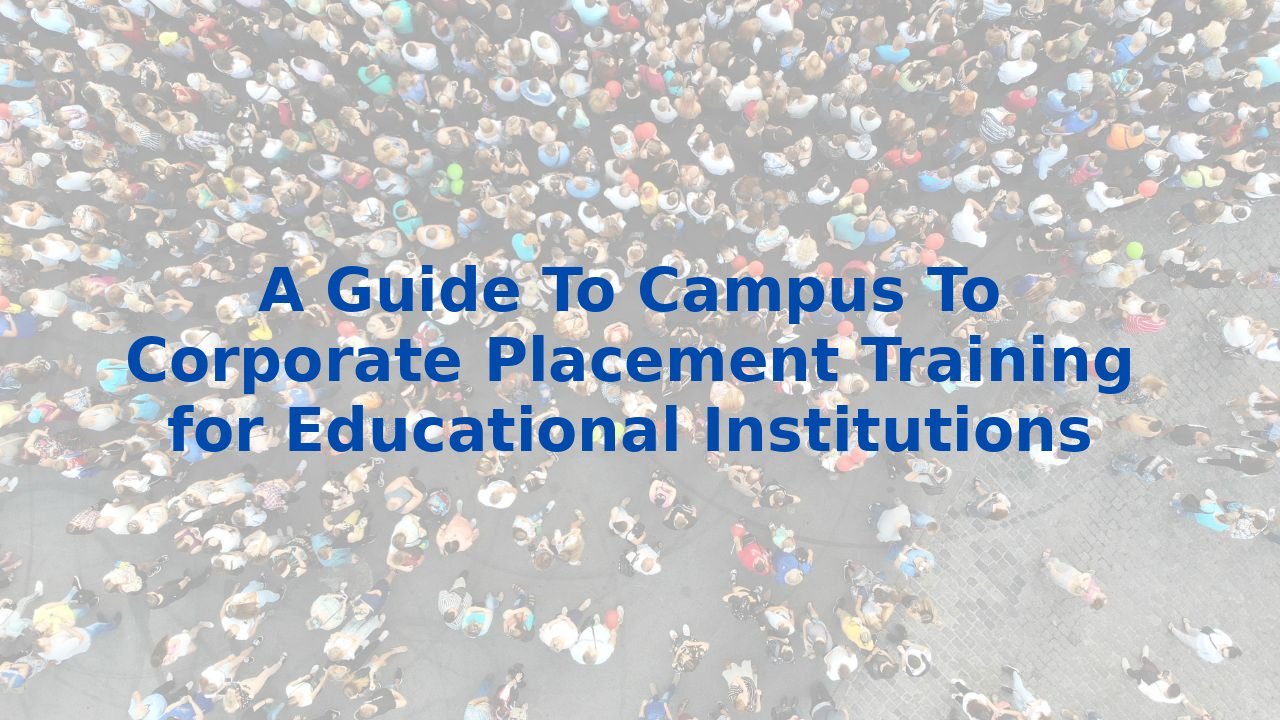A Guide To Campus To Corporate Placement Training for Educational Institutions
A Guide To Campus To Corporate Placement Training for Educational Institutions
Transitioning from campus to corporate life is no small feat—it requires a delicate balance of skills, knowledge, and adaptability. Educational institutions play a crucial role in readying students for this journey. One of the critical components of this transition is effective placement training, which often requires a refresh of traditional training methods. With the infusion of artificial intelligence (AI), educational institutions can revolutionize their approaches, providing students with the competitive edge they need in today’s ever-evolving job market.
Understanding Campus to Corporate Placement Training
Placement training serves as a bridge, connecting the theoretical knowledge gained in classrooms with the practical skills demanded by the corporate world. Typically, the core components of this training involve:
- Skill Development: Tailored programs that focus on enhancing both hard and soft skills.
- Interview Preparation: Mock interviews, resume workshops, and communication skill enhancement.
- Industry Engagement: Collaborating with companies to understand current trends and expectations.
- Networking Opportunities: Connecting students with industry professionals to foster relationships that may lead to job opportunities.
The Role of AI in Placement Training
AI can optimize these processes, offering personalized experiences that traditional methods struggle to provide. Here’s how AI enhances various aspects of placement training:
1. Personalized Learning Plans
AI algorithms can analyze individual students’ strengths and weaknesses, crafting tailored learning plans that cater to their specific needs. By adjusting the curriculum based on performance data, institutions can ensure that every student is equipped with the skills necessary to thrive in their chosen field.
2. Enhanced Interview Simulations
Virtual interview platforms powered by AI can simulate real-life interview scenarios, providing students with a risk-free environment in which to practice. Feedback can be instant and data-driven, honing students’ responses and improving their confidence as they prepare for the real thing.
3. Data-Driven Job Matching
AI systems can analyze job postings and student profiles, matching candidates with suitable job opportunities that align with their skills and interests. This not only speeds up the placement process but also increases the likelihood of a successful match, enhancing overall satisfaction for both employers and employees.
4. Ongoing Skill Assessment
Through continuous assessment, AI can monitor students’ progress and provide insights for further development. This ensures that training is dynamic, allowing adjustments in real-time to better meet industry demands.
Benefits of AI in Organizational Efficiency
Integrating AI into training programs not only benefits students but educational organizations as a whole. Here are some key advantages:
- Improved Efficiency: Automation of administrative tasks allows faculty to focus on teaching and mentoring rather than paperwork.
- Resource Optimization: AI can help institutions allocate resources more effectively, ensuring that training programs are both cost-effective and impactful.
- Scalability: AI-driven solutions can easily scale, accommodating increasing numbers of students without compromising quality.
The Importance of Training for AI
As the integration of AI becomes more prevalent, equipping students and educators with the understanding of AI tools is crucial. Training programs that focus on AI skills not only prepare students for specific jobs but also promote a culture of innovation within organizations.
Moreover, by investing in comprehensive AI training for employees, educational institutions can cultivate a workforce that is not only adept at utilizing AI but also at pushing boundaries—transforming challenges into opportunities. Programs dedicated to AI Training & Certification for your entire Organisation can play a pivotal role in this endeavor.
Conclusion
The transition from campus to corporate does not have to be a daunting task. With effective placement training enhanced by AI, educational institutions can empower students to embark on their professional journeys with confidence and competence. As the demand for tech-savvy professionals continues to rise, those who embrace AI in their learning processes will stand out in the competitive job market.
"In the evolving landscape of work, adaptability and continuous learning are key. Embrace the future with AI and unlock limitless potential."



